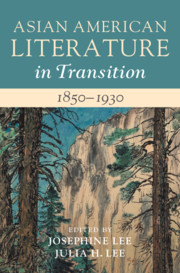Book contents
- Asian American Literature in Transition, 1850–1930
- Asian American Literature in Transition
- Asian American Literature in Transition, 1850–1930
- Copyright page
- Contents
- Illustrations
- Notes on Contributors
- Series Preface
- Introduction: Asian American Literature in Transition, 1850–1930
- Part I Empire and Resistance
- Chapter 1 Reframing Colonial Fantasy and Benevolent Violence
- Chapter 2 Uncollected
- Chapter 3 South Asian American Anti-colonial Writings
- Chapter 4 Challenging Enactments of Power
- Chapter 5 Saum Song Bo on the Statue of Liberty
- Chapter 6 Island in Between
- Part II Bodies at Work and Play
- Part III Crossings
- Bibliography
- Index
Chapter 1 - Reframing Colonial Fantasy and Benevolent Violence
Marriage, Family, and “Global” Racial Consciousness in Edith Eaton’s Caribbean Stories
from Part I - Empire and Resistance
Published online by Cambridge University Press: 27 May 2021
- Asian American Literature in Transition, 1850–1930
- Asian American Literature in Transition
- Asian American Literature in Transition, 1850–1930
- Copyright page
- Contents
- Illustrations
- Notes on Contributors
- Series Preface
- Introduction: Asian American Literature in Transition, 1850–1930
- Part I Empire and Resistance
- Chapter 1 Reframing Colonial Fantasy and Benevolent Violence
- Chapter 2 Uncollected
- Chapter 3 South Asian American Anti-colonial Writings
- Chapter 4 Challenging Enactments of Power
- Chapter 5 Saum Song Bo on the Statue of Liberty
- Chapter 6 Island in Between
- Part II Bodies at Work and Play
- Part III Crossings
- Bibliography
- Index
Summary
This chapter examines Edith Maude Eaton’s (Sui Sin Far’s) two Caribbean tales, “Away Down in Jamaica” (1898) and “The Sugar Cane Baby” (1910), particularly the ways that the tropes of marriage and family illuminate the author’s evolving racial consciousness.By reading the stories in relation to the transnational history of Euro-American imperial and capitalist dominance, this chapter analyzes how these two stories bring to the fore the problems of colonial intrusion and imposition, both violent and benevolent, economic and moral.In this way, they call for “undoing whiteness” and “complicating Chineseness” through critical reframing of the conditions of slavery, forced migrations, and (neo)colonialisms that link the racialization of the Chinese in North America and Africans in the Caribbean that undergird imperial narratives of marriage and family.As such, Eaton’s use of these tropes in these two Caribbean tales enables her to extend her sympathy to both white imperialists and Afro-Creoles and also to carve out space for critiquing Euro-American colonial and imperial violence even as she negotiates her conflicting affinities to and distance from both the white elites and racialized peoples.
Keywords
- Type
- Chapter
- Information
- Asian American Literature in Transition, 1850–1930 , pp. 17 - 34Publisher: Cambridge University PressPrint publication year: 2021

